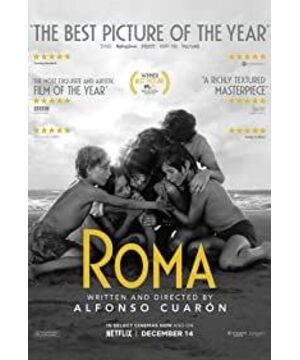In fact, a synonym for owning is struggling. Just like when you look at the sunset, you also get long shadows. There are no superficial people in this world, on the contrary everyone is deep because of love. Life is like that ocean, and it must be taken as an adventure, striving to cross every wave.
Text / Yelulu
1
In fact, a synonym for owning is struggling. Just like when you look at the sunset, you also get long shadows. There are no superficial people in this world, on the contrary everyone is deep because of love. Life is like that ocean, and it must be taken as an adventure, striving to cross every wave.
"Roma" does not tell the well-known empire, let alone Milan or Constantinople, but director Alfonso Cuaron's second filming of the story of Mexico's homeland after "your mother too" .
In the turbulent social atmosphere of the early 1970s, a middle-class family in the Roman community of Mexico City also experienced many changes. The maid and the hostess, both experienced betrayal and parting, and finally moved forward side by side in the name of love.
In the four-minute long shot at the beginning of the film, facing the floor that is being cleaned, a plane slowly passes by in the reflection of the water surface, pulling the audience into a dreamland. At the end of the film, the maid climbed the iron escalator, another plane passed by in the freeze-frame shot, and the subtitle raised "Dedicated to Libo", only when I woke up did I realize that this dream turned out to be the director's memory.
2
The woman who cleaned the floor was named Kelio, one of the two maids in the family, hereinafter referred to as Xiao Ke. The film takes her as the target character and tells the story. In addition to doing laundry, cooking and housework, taking care of the four children of the hostess Sophia is the most important daily work for Xiaoke.
Putting the kids to bed late at night and turning off all the lights in the house means her work day is coming to an end. Climbing up the iron stairs to return to my residence, the first thing I do is turn off the lights and light candles, for fear that the hostess will accuse me of consuming electricity. In the dim candlelight, she and her companions worked out to burn off excess calories. Early the next morning, she would wake up the children one by one, take care of food and drink, and urge them to go to school.
While doing laundry on the rooftop, she sang leisurely "But I was born poor, you will never love me". Suddenly the children were playing, and the little boy lay on the ground and said, "I'm dead." Xiao Ke lay down with him and said, "I like the feeling of being dead." Then the camera slowly rises, skimming over the drying clothes, trying to capture the fragrance in the air. The movie is very poetic in this section, showing the relationship between Xiao Ke and the children. Presumably, this is also the softest picture in Caron's memory.
The life of Xiao Ke and his companions is not as monotonous as he imagined. After work, they also have some free time to watch movies, drink soda, or go on dates. On a date, Xiao Ke met Fermin, a young man. The two were dating at the hotel, but he performed a martial arts session naked. At the end of the performance, he began to pour out his heart, saying that he had nothing but martial arts.
Every Chinese has a martial arts dream, but no one would have guessed that it could be used when Luan Dianfeng fell. This is probably the most bizarre way to show martial arts.
Xiao Ke was not surprised, just like the whole family was looking forward to watching Sophia's husband drive home. Cigarettes and music lingered in the car, and after some tuning operations, the car parked accurately in the garage. Patriarchy is always accompanied by words such as precision and rationality, so making parking is quite ceremonial.
The seemingly peaceful life gradually stirred up waves in silence. Her husband is leaving for a meeting in Quebec, and Sophia realizes a crisis and says goodbye affectionately. Xiao Ke was at the movie theater and told Fermin that she didn't have her period, maybe she was pregnant, and then he never returned, leaving only one piece of clothing.
Both women are passive, accepting sudden changes. The story is getting better here, and the structure is relatively clear in the future. They went from passive acceptance to active attack, trying to change the status quo.
3
Xiao Ke's boyfriend Fermin, like most poor people, has no reliable source of livelihood except for having a strong arm and being able to dance knives and guns. Suddenly I thought of a line in "Big Buddha Plath", saying that the world of the poor is gray. "Roma" tells about middle-class life, and also uses gray, but just wants to create a sense of age.
When Xiao Ke went to the countryside and found him on the pretext of returning his clothes, he not only uttered wild words, but also drove him away by force, making it clear that he did not want to take any responsibility. Before leaving, he did not forget to scold and dislike Xiaoke's status as a servant.
In today's society, it has become a common practice to marry a child. Although it is not a manifestation of a sense of responsibility, as long as the pot is uncovered, there will be a happy ending.
Is it true that Fermin abandoned Xiaoke because of poverty? Let's take a look at the Sophia family.
It turned out that the husband did not leave Mexico City, but another beloved sympathetic wife eloped. The children went to the movies and even saw their father in the crowd. He didn't send money home for six months, but he fell in love with diving and bought a lot of new gear. When I first saw it, I thought it was incredible. Even if a man does not love his wife, can he bear to leave his children behind?
It can be seen that the abandonment of wives and children is not limited to the poor, but is even more typical of the middle class. Some people can't help but conclude that the two women were abandoned, not only showing the tough character of women, but also achieving class integration because of feminism. I don't deny this point of view, but the director will never be so narrow-minded and blame all the mistakes on scumbags. The same tragedy happened to the two classes, and I am afraid that this pot man will not be able to carry it.
"Roma" takes place around 1971, and Mexico's social transformation is in the middle, after decades of turbulence and "neoliberal" reforms. At the beginning of the film, the children at the dinner table also mentioned that a child was shot and killed by a soldier for throwing a balloon on a military vehicle. It can be seen that the social atmosphere at that time, no matter what class, will lack a sense of security.
4
Maybe because of the common experience, Sophia did not fire Xiaoke. When she learned that Xiao Ke was pregnant, she also took her to the hospital for examination. After the inspection, Xiao Ke looked at the baby room through the glass, and an earthquake suddenly occurred. At this time, the camera gave a close-up, and I saw that she was in a trance and at a loss. There are two interpretations here. One is that there are frequent earthquakes in Mexico, and Xiao Ke panicked because of fear; the other is that Xiao Ke became pregnant out of wedlock and faced life security and changing fate.
Xiao Ke was approaching her due date, and the old man took her to Furniture City. As soon as I saw a crib, there was a riot in the street. Looking through the window, students and government troops clashed head-on, and screams could be heard from time to time on the street. Then shouts and gunshots approached, and a man and woman rushed into Furniture City to seek shelter, followed by a gang of young men with guns. Not surprisingly, the male student was shot, and Xiao Ke was being pointed at by a pistol. The person driving the pistol was Fermin who abandoned her. In the fright, Xiao Ke slowly lowered his head, and the amniotic fluid ruptured in advance.
The tunnel was crowded with cars, whistling constantly. Xiao Ke lay in the arms of the old man with a heart-piercing expression. In the end, she gave birth to a baby girl in the hospital, but she was born with no signs of life. After a short hug, it was handed over to the doctor to wrap it up.
It is really sad that a life has just been born and quickly accepts death; but if she survives, she must experience the courage of her mother, which is actually very cruel. When I saw this passage, my eyes were fixed on the baby wrapped in white cloth, and I couldn't express any feelings or shed any tears. In short, it is a viewing experience that is difficult to describe in words.
On June 10, 1971, in Mexico City, the Corpus Christi massacre that shocked the world occurred. More than 100 students were brutally killed by the Mexican military during the parade. This revolution might have happened in the afternoon when Xiao Ke bought the crib. Cuaron's use of the era she lived in to connect with her personal destiny undoubtedly adds a layer of sadness to the story.
5
The children went to their uncle's house for Christmas, and a child in a space suit was walking in the woods, which was exactly the projection of Cuaron himself. The reason is that he had two dreams as a child, to be a director or an astronaut. The movie "Blue Fireworks" watched by the children is also a space movie he is obsessed with.
Ninety percent of the scenes in the film come from my memory, some direct, some roundabout, but it’s all about the era that shaped me, or the era that shaped Mexico, and that’s the beginning of a long epoch in Mexico. —Alfonso Cuaron in an interview
Seemingly private stories, used to express an entire era, are the usual way for many creators. In "Sunny Days", Jiang Wen used lazy colors to restore his youth. "Roma" is no exception, Cuaron restores his memory with a gray image. In addition to personal expressions, these works are more or less mixed with information of the times.
Xiao Ke went to the countryside to find a boyfriend, just as a kung fu master was training militiamen. He closed his eyes, put his hands around his head and left the ground with one foot. After a while, he finally spoke, saying that he was doing a great feat. It would be difficult to succeed without a strong will. Many people scramble to imitate, but Xiao Ke in the crowd successfully stands.
It can be seen that the matter of will seems to be illusory, but a few people are sick, but they require everyone to take medicine.
After her husband left, Sophia tried to salvage the situation, asking the children to write to him, "Dad, I miss you so much." But even this is of no avail. The patriarchal image is like social stability, and he resolutely left.
Sophia Xiaoke was eating cones with the children, and a newlywed couple happened to be married. The composition is exquisite, the contrast is no less than Christmas Eve, the rich are upstairs, the poor are downstairs, and finally a big fire bids farewell to the old and welcomes the new. These contrasts, contrasts, and allusions are indeed a high-level expression.
6
At the end of the film, Sophia used a trip to tell the truth to the children and said, "The next life is an adventure, we have to face it together, hand in hand and shoulder to shoulder". In fact, it is to free up time for her husband to move. On the way back, the children were going to play in the sea, but they were engulfed by the sea. Xiao Ke, who can't swim, rushed into the sea without hesitation, and finally rescued two children from the waves.
Back on the beach, the six people hugged each other and cried, but Xiao Ke finally let go and said loudly, "I didn't want her in the first place!"
Xiao Ke repeated "I didn't want her at all", and I suddenly realized that, in fact, the synonym of having is struggling. Just like when you look at the sunset, you also get long shadows. There are no superficial people in this world, on the contrary everyone is deep because of love. Life is like that ocean, and it must be taken as an adventure, striving to cross every wave.
Excellent work, the problem remains after the story is told, "Roma" is such a movie. The ending shot looks up at the sky, giving people an upward desire, just in line with what Sophia said, "The next life is an adventure, we have to face it together, hand in hand and shoulder to shoulder".
Off topic:
"Roma" won the Golden Lion Award with a record-breaking score of 4.4 points in the main competition unit of the 75th Venice Film Festival.
The top nine of the 91st Academy Awards for Best Foreign Language Film were released, and "Roma", "Burning" and "The Thief" were all selected. The final nominations will be announced on January 22 next year.
Korean director Lee Chang-dong's "Burning" was once the most popular work in Cannes, but the film that finally won the Palme d'Or was "The Thief Family" by Japanese director Hirokazu-eda.
When I met Oscar again, while lamenting the "narrow road to friends", I have to say that Oscar's appeal has the momentum of "dominating" the two major festivals in Europe. But then again, one more award for an excellent film is just the icing on the cake.
This article was first published on ONE
Text | Yeluli
Fiction author, freelance writer.
View more about Roma reviews











